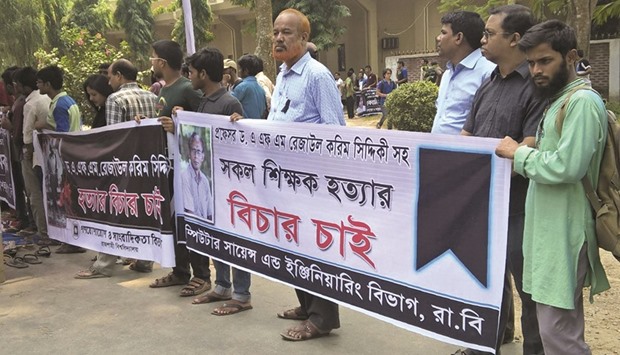Bangladesh police were yesterday investigating a new hit-list that includes the head of a university, journalists and ruling party officials, after a series of gruesome killings.
Police said they were taking seriously the threat to kill 10 people listed in a leaflet that was sent to a press club in the northwestern town of Natore on Monday by a hitherto unknown group.
Among those named was the head of Rajshahi University, where a liberal professor was hacked to death by suspected Islamists less than two
weeks ago.
“The leaflet bears the name of Islami Liberation Front. It said it has launched a mission to kill the 10 people,” Natore police chief Shymal Kumar Mukherjee said.
“We don’t know anything about this group. There are no previous information about this group. We have taken the matter seriously,” he said.
The Islami Liberation Front said its objective was to establish an Islamic caliphate in Bangladesh by toppling what it called the “repressive”
government.
Police in the city of Rajshahi said they were guarding those named and investigating the authenticity of the threat.
“We’re giving special attention to these people,” deputy chief of Rajshahi police Sardar Tamizuddin Ahmed said.
Police said more than 1,000 students and teachers and students rallied on the Rajshahi University campus yesterday to protest at the murder of English professor Rezaul Karim Siddique, who was a poet and leading
cultural activist.
Shortly after his killing, which has been claimed by the Islamic State group, two gay activists were hacked to death elsewhere.
Their killings were subsequently claimed by a
Bangladeshi branch of Al Qaeda.
Teachers and students have been boycotting classes at the university since Siddique’s murder on April 23, demanding justice and the arrest of the killers.
“The killers must be brought to book immediately. The government must protect the teachers and liberal voices as we’re all feeling insecure,” the head of Rajshahi University Teachers Association, Shahid Ullah, said.
Bangladesh’s government has been criticised for not doing enough to stem the tide of violence. At least 30 members of religious minorities, secular bloggers and other liberal activists, foreigners and intellectuals have been murdered in the past three years.
The government denies outside involvement in the killings, saying neither the IS group nor Al Qaeda have a presence in the country and blaming banned local militant groups for the
attacks.
National police chief A K M Shahidul Hoque yesterday denied authorities were not doing enough to bring the perpetrators to justice.
He said there had been 37 attacks related to Islamist militancy since February 2013, when an atheist blogger was hacked to death by homegrown militants.
“We were able to unearth the motives in 33 cases and have detained 144 people in connection with the cases,” he told reporters.
A long-running political crisis in officially secular Bangladesh has radicalised opponents of the government and analysts say Islamist extremists pose a growing danger.

Students taking part in a protest against the killing of a university professor in Rajshahi, yesterday in Dhaka.
